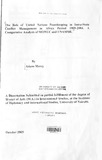| dc.contributor.author | Atieno, Mercy | |
| dc.date.accessioned | 2013-04-29T09:39:34Z | |
| dc.date.available | 2013-04-29T09:39:34Z | |
| dc.date.issued | 2005 | |
| dc.identifier.citation | A Dissertation Submitted in partial fulfillment of the degree of Master of Arts (M.A.) in International Studies, at the Institute of Diplomacy and International Studies, University of Nairobi. | en |
| dc.identifier.uri | http://erepository.uonbi.ac.ke:8080/xmlui/handle/123456789/17588 | |
| dc.description.abstract | This study sets out to investigate the role of United Nation peacekeeping operation in the management of internal conflict in Africa during the post- Cold War period from 1989 t02004. It provides an over view of United Nations peacekeeping operations role in conflict management. It focuses on the nature and profile of international involvement in the United Nations most challenging missions in Africa namely the Mission in Sierra Leone and the Democratic Republic of Congo with the view to using comparative study of the two cases.
The basis of argument IS that commitment gap In terms of political will between undertakings of states in the Security Council Resolution and resources they are willing to devote remains a crucial problem. Lack of political will in ending conflict, interest of actors in conflict, economic constraint are some of the emerging challenges affecting the effectiveness of peacekeeping operations.
On several cases the Security Council and member states, found themselves unable to take action to halt the escalation in violence. At the same time, they recognized that multilateral action would require the international community to become involved in internal matters and therefore had to face the prospect of breaching the important and vital principle of respect for national sovereignty.
The study has concluded that alignment of political will and resources devoted by the international community contributes to ultimate success in the peacekeeping operation in any situation. This is coupled with long-term commitment in ending the conflict as evidenced in the two case studies. | en |
| dc.language.iso | en | en |
| dc.title | The role of united nations peacekeeping in intra-state conflict management in Africa period 1989-2004. A comparative analysis of MONUC and UNAMSIL | en |
| dc.type | Thesis | en |

